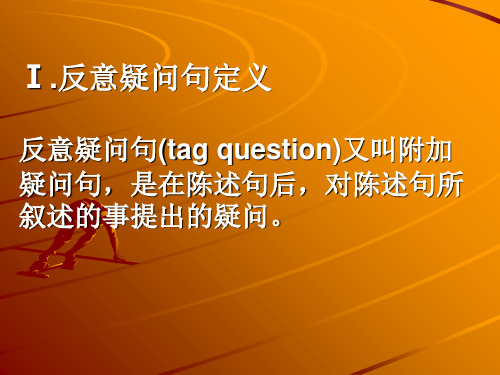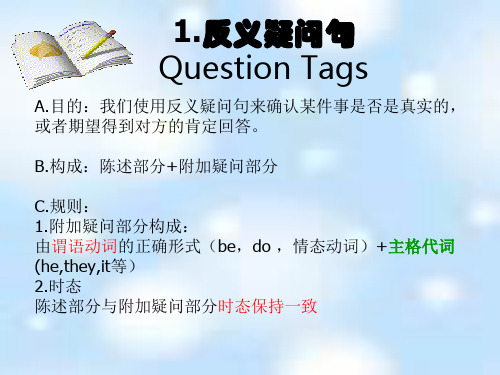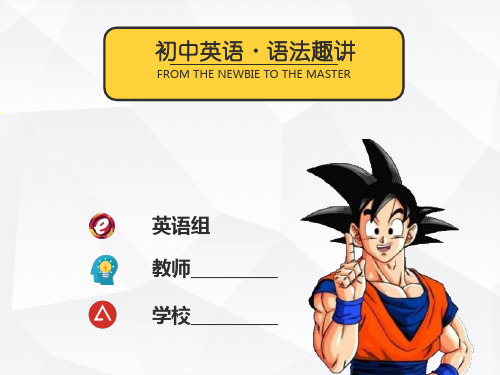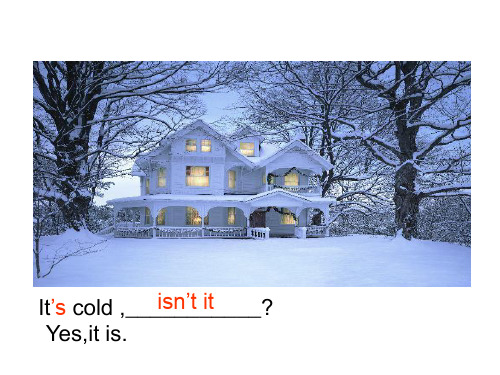八年级反义疑问句课件
合集下载
反意疑问句ppt课件

• Jack wasn’t playing soccer, _w__a_s _h_e___? • Their parents have gone to London,
__h_a_v_e_n_’_t t_h_e_y__? • I have never been to the park, __h_a_v_e_n’_t_I__? • You have a good friend, __d_o_n_’t_y_o_u___? • We had a meeting, __d_i_d_n_’t_w_e___?
Grammar: 反意疑问句
一、定义:
当我们陈述了一个事实,而又不是很 有把握,就可以在陈述句后加一个简 短问句,称为反意疑问句。它表示提 问人的看法,没有把握,需要对方证 实。反义疑问句由两部分组成:前一 部分是一个陈述句,后一部分是一个 简短的疑问句,两部分的人称时态应 保持一致。
二、结构:
结构一: 前肯,+ 后否 eg. She is a student, isn’t she?
结构二: 前否,+ 后肯 eg. She isn’t a student, is she?
三、反意疑问句的解答步骤
1. 判定(判断该用肯定还是否定); 2. 找动(找句子的助动词:be用be,动词原形do, 三单does,过去did,完成have); 3. 换代(将主语换为人称代词);
2. 一般动词(play, study, watch 等)句型:
现在 主语+play/plays…, don’t (doesn’t) + 主语? 过去 主语+played…, didn’t + 主语?
1 Your mother likes cooking ,_d__o_e_s_n_’t_s_h_e___? 2 He has an apple, __d_o_e_s_n_’_t _h_e____? 3 The plane took off an hour ago, __d_i_d_n_’t_i_t___? 4 He didn’t go to school late this morning,
完整反义疑问句课件

如果陈述句是肯定的,反义疑问句应该是否定的。
2 人称一致
陈述句和反义疑问句中的主语和动词人称要保持一致。,避免使用复杂的句子结构。
结束语
通过学习反义疑问句的结构和用法,我们可以更好地理解和运用这个表达方 式,提升我们的语言表达能力。
完整反义疑问句PPT课件
PPT介绍反义疑问句
什么是反义疑问句?
反义疑问句是指一种用于提问或表示疑问的句子结构,通常由一个陈述句和一个反义疑问句构成。
反义疑问句的结构
1
陈述句部分
包含陈述句的主谓宾结构
2
反义疑问句部分
由一个助动词和一个否定词构成
3
连接词
连接陈述句和反义疑问句的部分,常用的连接词包括but和yet
反义疑问句的语气和语调
语气
反义疑问句通常用于表示疑问、请求或强调某 种认可的语气。
语调
反义疑问句通常以升调结尾,以引起对方的回 答或注意。
反义疑问句的用法与例句
询问意见
这个计划听起来很好,不是吗?
表示认可
你很喜欢这部电影,对吗?
确认信息
你不会去参加聚会,对吗?
反义疑问句的注意事项
1 肯定陈述,否定反义疑问
2 人称一致
陈述句和反义疑问句中的主语和动词人称要保持一致。,避免使用复杂的句子结构。
结束语
通过学习反义疑问句的结构和用法,我们可以更好地理解和运用这个表达方 式,提升我们的语言表达能力。
完整反义疑问句PPT课件
PPT介绍反义疑问句
什么是反义疑问句?
反义疑问句是指一种用于提问或表示疑问的句子结构,通常由一个陈述句和一个反义疑问句构成。
反义疑问句的结构
1
陈述句部分
包含陈述句的主谓宾结构
2
反义疑问句部分
由一个助动词和一个否定词构成
3
连接词
连接陈述句和反义疑问句的部分,常用的连接词包括but和yet
反义疑问句的语气和语调
语气
反义疑问句通常用于表示疑问、请求或强调某 种认可的语气。
语调
反义疑问句通常以升调结尾,以引起对方的回 答或注意。
反义疑问句的用法与例句
询问意见
这个计划听起来很好,不是吗?
表示认可
你很喜欢这部电影,对吗?
确认信息
你不会去参加聚会,对吗?
反义疑问句的注意事项
1 肯定陈述,否定反义疑问
反义疑问句详细讲解课件(PPT27张)

I don’t believe he has finished his work.
7.当陈述部分的主句是I think (expect, believe)等结构时,反 意疑问句的附加部分则往往与从 句中的主语和谓语动词保持对应 关系,但要注意否定的转移。 例如:
I think he’s funny, isn’t he? I don’t believe she likes my
You must have seen the film last week, didn’t you?
6. 当陈述部分是I am…时,反意疑 问句部分通常要用aren’t I;如陈述 句部分的主语是I am not时,反意疑 问句部分通常要用am I。 例如:
1)I am a teacher, aren’t I?
Ⅰ.反意疑问句定义
反意疑问句(tag question)又叫附加 疑问句,是在陈述句后,对陈述句所 叙述的事提出的疑问。
Ⅱ.基本结构:
陈述句+逗号+简短的一般疑问句?
遵循前肯定后否定前否后肯式的原则
①前肯后否式。例如:
You are all students, aren’t you﹖
②前否后肯式。例如:
Let’s have a rest, shall we? 以let us开头的祈使句,不包括 说话人在内,因此反意疑问句的 附加部分用will you。例如:
Let us stop now, will you?
Ⅳ. 反意疑问句的回答 “ 根据事实回答”
对反意疑问句的回答,无论问题的提法如何,如果 事实是肯定的,就用yes,事实是否定的,就要用no。 要特别注意陈述句部分是否定结构,反意疑问句部分 用肯定式提问时,回答yes或no与汉语正好相反。这 种省略回答的yes要译成“不”,no要译成“是”。
7.当陈述部分的主句是I think (expect, believe)等结构时,反 意疑问句的附加部分则往往与从 句中的主语和谓语动词保持对应 关系,但要注意否定的转移。 例如:
I think he’s funny, isn’t he? I don’t believe she likes my
You must have seen the film last week, didn’t you?
6. 当陈述部分是I am…时,反意疑 问句部分通常要用aren’t I;如陈述 句部分的主语是I am not时,反意疑 问句部分通常要用am I。 例如:
1)I am a teacher, aren’t I?
Ⅰ.反意疑问句定义
反意疑问句(tag question)又叫附加 疑问句,是在陈述句后,对陈述句所 叙述的事提出的疑问。
Ⅱ.基本结构:
陈述句+逗号+简短的一般疑问句?
遵循前肯定后否定前否后肯式的原则
①前肯后否式。例如:
You are all students, aren’t you﹖
②前否后肯式。例如:
Let’s have a rest, shall we? 以let us开头的祈使句,不包括 说话人在内,因此反意疑问句的 附加部分用will you。例如:
Let us stop now, will you?
Ⅳ. 反意疑问句的回答 “ 根据事实回答”
对反意疑问句的回答,无论问题的提法如何,如果 事实是肯定的,就用yes,事实是否定的,就要用no。 要特别注意陈述句部分是否定结构,反意疑问句部分 用肯定式提问时,回答yes或no与汉语正好相反。这 种省略回答的yes要译成“不”,no要译成“是”。
人教版八年级下Unit 10 语法(反义疑问句)课件4

反意疑问句的基本结构有两种:一是:肯定 陈述句+简短的否定问句 ;二是:否定陈述 句+简短的肯定问句。简称“前肯后否,前 否后肯。”
He is a teacher , isn’t he ? She didn’t go to school ,did she ?
反意疑问句的前后两部分在时态、人称和数上都要保持一致。
There is something wrong with your watch,____________? isn’t there are’t there There are many attractions on the board ,__________
was there There wasn’t a river around the village, ____________?
她没去上学,是吧?
不!她去了
是的!她没去
Yes, she did.
No, she didn’t He is a teacher , isn’t he ?他是个老师,不是吗? Yes, he is.
No, he isn’t
Don’t do that again, will you?
_____________, I will never do it . D A. Sorry, I do B. No, I do
isn’t it 4. Nice day, ___________?
aren’t you 5. You are new here, ____________?
doesn’t it 6. The No. 15 bus stops here, _________? isn’t it 7. The line is moving slowly, ___________? aren’t they 8. These shirts are really expensive, _____________? doesn’t it 9. It always rains on the weekend, _______________? wasn’t it 10. It was really exciting, __________________?
反义疑问句(共14张PPT)全

二、前否+后肯
1.She wasn’t ill last week, was she ? 2.It doesn’t often rain here, does it? 3.Tom won’t go to Shanghai next year,
will he ?
特殊用法1—祈使句的反义疑问句
1、肯定祈使句的反意疑问句,疑问部分用will you或won’t you,否定祈使句则用will you ? 如: Don't do that again, will you? Go with me, will you / won't you?
13、He who seize the right moment, is the right man.谁把握机遇,谁就心想事成。2024/10/172024/10/172024/10/172024/10/1710/17/2024 +14、谁要是自己还没有发展培养和教育好,他就不能发展培养和教育别人。2024年10月17日星期四2024/10/172024/10/172024/10/17 +15、一年之计,莫如树谷;十年之计,莫如树木;终身之计,莫如树人。2024年10月2024/10/172024/10/172024/10/1710/17/2024 +16、教学的目的是培养学生自己学习,自己研究,用自己的头脑来想,用自己的眼睛看,用自己的手来做这种精神。2024/10/172024/10/17October 17, 2024 +17、儿童是中心,教育的措施便围绕他们而组织起来。2024/10/172024/10/172024/10/172024/10/17
一 、前肯+后否 含be动词
1.He is a doctor, isn’t he? 2.I am Chinese, aren’t I?
人教版英语八年级上册-Unit 10 反义疑问句(课件)

I think you are right, aren’t you?
I don’t believe he studies harder, does he?
He never said he was a good student, did he?
四.陈述部分主语是 everyone, everybody, someone, somebody, anybody, no one, nobody等时, 疑问部分用 they/he;陈述部分是everything, something, nothing, anything 时,疑问部分用 it .
5. Please call me, ____________? 6.Don’t be late next time, __________?
2.在Let’s祈使句后加上 shall we? shan’t we? 在Let us(me, him..) 后加上 will you? 或
won’t you?
二.陈述部分是I am 或 I’m 时,疑问部分用 aren’t I.
I am having an English lesson, __a_re_n_’_t_I__?
三.宾语从句中,以主句为准,但如果主语是第一人称 (I/We)且谓语动词是think, believe, guess, suppose 时, 以从句为准.
These are your friends, aren’t they?
注意
1.前否后肯要根据事实来回答,事实是肯定的用 Yes.事实是否定的用No.
2.前否后肯的Yes译为“不”,No译为“是的”。
1.You aren’t a teacher, are you?你不是老师,是吗? Yes, I am. 不,我是。/ No, I’m not.是的,我不是。
I don’t believe he studies harder, does he?
He never said he was a good student, did he?
四.陈述部分主语是 everyone, everybody, someone, somebody, anybody, no one, nobody等时, 疑问部分用 they/he;陈述部分是everything, something, nothing, anything 时,疑问部分用 it .
5. Please call me, ____________? 6.Don’t be late next time, __________?
2.在Let’s祈使句后加上 shall we? shan’t we? 在Let us(me, him..) 后加上 will you? 或
won’t you?
二.陈述部分是I am 或 I’m 时,疑问部分用 aren’t I.
I am having an English lesson, __a_re_n_’_t_I__?
三.宾语从句中,以主句为准,但如果主语是第一人称 (I/We)且谓语动词是think, believe, guess, suppose 时, 以从句为准.
These are your friends, aren’t they?
注意
1.前否后肯要根据事实来回答,事实是肯定的用 Yes.事实是否定的用No.
2.前否后肯的Yes译为“不”,No译为“是的”。
1.You aren’t a teacher, are you?你不是老师,是吗? Yes, I am. 不,我是。/ No, I’m not.是的,我不是。
反义疑问句PPT课件

陈述部分
疑问部分
mustn't表示“禁止,不可, 不必”时
must
例句
You mustn't stop your car here,must you?
must表示“有必要”时
needn't
They must finish the work today,needn't they?
当must用来表示对现在的 情况进行推测时
She must have read the novel last week,didn't she?
Your daughter must have 要用“haven't/hasn't+主语”。 been to Africa, hasn't
she ?
You must be tired , _ar_e_n’_t _yo_u___ ?
2) 祈使句式反意疑问句
Let’s go home,_s_h_a_ll_w_e_? Let us go,__w__il_l _yo_u__? Let me go,_w__il_l _y_ou__? Come here please, __w_i_ll_y_o_u__? Never ask her again,_w__il_l /_c_a_n__y_ou__?
语
there, didn't he? / usedn't he?
had better(最好) + v.
hadn't you?
would rather(宁可、宁愿) +v.
wouldn't +主语
You'd like to +v.
反义疑问句详细讲解课件(PPT27张)

2) have to表示“不得不,必须”之意 时,附加问句的谓语应用助动词do.
Kate has to help her mother at home,doesn’t she?
3) have表示“吃,喝,玩,度过”等意 思时,其附加问句的谓语应用助动词do.
They had a good time in Beijing ,didn’t they?
Ⅰ.反意疑问句定义
反意疑问句(tag question)又叫附加 疑问句,是在陈述句后,对陈述句所 叙述的事提出的疑问。
Ⅱ.基本结构:
陈述句+逗号+简短的一般疑问句?
遵循前肯定后否定前否后肯式的原则
①前肯后否式。例如:
You are all students, aren’t you﹖
②前否后肯式。例如:
[误] Tom can speak Chinese well, can’t Tom﹖
[正] Tom can speak Chinese well, can’t he﹖
一般现在时:
Lily likes going shopping, d_o_e_s_n__’t_she? They aren’t students, __a_r_e___
You must have seen the film last week, didn’t you?
6. 当陈述部分是I am…时,反意疑 问句部分通常要用aren’t I;如陈述 句部分的主语是I am not时,反意疑 问句部分通常要用am I。 例如:
1)I am a teacher, aren’t I?
The End
They must come on time,needn’t they?
2)must表示推测,“一定,想必”之意,附加问 句的谓语动词的确定应根据must后面的动词。
Kate has to help her mother at home,doesn’t she?
3) have表示“吃,喝,玩,度过”等意 思时,其附加问句的谓语应用助动词do.
They had a good time in Beijing ,didn’t they?
Ⅰ.反意疑问句定义
反意疑问句(tag question)又叫附加 疑问句,是在陈述句后,对陈述句所 叙述的事提出的疑问。
Ⅱ.基本结构:
陈述句+逗号+简短的一般疑问句?
遵循前肯定后否定前否后肯式的原则
①前肯后否式。例如:
You are all students, aren’t you﹖
②前否后肯式。例如:
[误] Tom can speak Chinese well, can’t Tom﹖
[正] Tom can speak Chinese well, can’t he﹖
一般现在时:
Lily likes going shopping, d_o_e_s_n__’t_she? They aren’t students, __a_r_e___
You must have seen the film last week, didn’t you?
6. 当陈述部分是I am…时,反意疑 问句部分通常要用aren’t I;如陈述 句部分的主语是I am not时,反意疑 问句部分通常要用am I。 例如:
1)I am a teacher, aren’t I?
The End
They must come on time,needn’t they?
2)must表示推测,“一定,想必”之意,附加问 句的谓语动词的确定应根据must后面的动词。
初中英语语法反义疑问句课件

6 .— Pass me the dictionary, (
)?
— Yes, with pleasure.
A .would you
B .will you
C .won’t you
D .wouldn’t you
7 .There won’t be any concert this Saturday evening, ( )? A. will there not B. will there C. is there D. won’t
小试牛刀
1 .There is little we can do about it, _i_s_t_h__e_re__? 2 .Linda ate nothing this morning, __d_i_d__s_h_e__? 3 .Kate’s hardly late for school, _____is__sh__e____?
小试牛刀
1 .--- Beginning of The Great Revival is on at the cinema. Let’s go to see it,( ) ? --- OK. Let’s go. A .will you B .shall we C .won’t we D .don’t you
前否后肯
Lucy isn’t stupid, is she? Yes, she is. 她笨 No, she isn’t. 她不笨
小试牛刀
Da Cong isn’t a careless boy, is he ? He wasn’t there, was he ? They don’t go to school on Saturdays, do they ? Mike doesn’t have any money, does he ?
初中反义疑问句PPT课件

18
He was hardly twelve then, was he ? 那时他还不到12岁吧,对吗?
.
19
1. Linda went to the zoo three times last year ,__d_id_n_’_t_s_h_e_?
2.This is your sister,___i_s_n_’t_s_h_e______?
.
10
3. 情态动词(can, will)的反意疑问句
主语+can/will …, can’t /won’t + 主语?
1 Tom can swim very well, _c_a_n__’t_h_e___? 2 Your parents can’t swim, __c_a_n_t_h_e_y____? 3 All of your friends will come to your party, _w__o_n_’t_t_h_e_y__? 4 They won’t come,_w_i_ll_t_h_e_y__?
找错isnthecantyoudidnthe22hehasfewfriendsdoeshehaveneverbeen对反意疑问句的回答无论问题的提法如何如果事实是肯定的就用yes事实是否定的就要用要特别注意陈述句部分是否定结构反意疑问句部分用肯定式提问时回答yes或no与汉语正好相反
It’s cold ,___is_n_’_t _it____? Yes,it is.
about 2 years,_w_o_n_’_t_t_h_e_re_? 15 Open your books, __w__il_l _y_o_u____?
16 Don’t go across the road now, ___w_i_ll_y_o_u___?
初中英语《反义疑问句》优质课件

)?eh seod( ?yeht od ,ti tuoba swonk ydoboN )?eh seod( ?yeht t'nod ,rewsna eht swonk enoyrevE 。eh数单用也时有�yeht数复用常分部问疑�等 eno on ,ydobon ,ydobemos ,enoyna ,ydobyreve词代定不是语主分部述陈 )51 ?ehs t'nac ,retteb ti od nac ehs eveileb eW ?eh si ,thgirb si eh kniht t'nod I 。句问疑意反成构应对相 句从语宾与分部问疑�)时称人一第是语主句主当其尤(句从语宾的 导引等enigami ,esoppus ,tcepxe ,eveileb ,kniht是语谓句主分部述上 .c ?eh t'ndid ,napaJ tisiv ot detnaw eh dias eH ?eh si ,klat a su evag ohw nam eht ton si eH �定而语 谓的句 主据根语谓分部问疑�句合复从主的句从语宾�句从语定有带 .b ?eh t'ndluohs , neht anihC ni neeb evah dluohs eh ;semit lareves rof gnijieB ot neeb dah htimS .rM 。定而语谓的句从近邻据根词动语谓�分部问疑句合复列并 .a �况情种三有分部问疑�句合复列并或句从语主为分部述陈 )41 ?ti t'nsi ,ydaer si gnihtyrevE 。ti用语主分部问疑 ,siht ,gnihton ,taht ,gnihtyreve词代定不或词代示指是语主分部述陈 )31
?eh t’ndluohs ?eh t'nthguo ,od ot tahw wonk ot thguo eH .)4 ? yeht od ,)花开( nwolb reven stnalp emoS .)3 ?I yam ,uoy htiw drow a evah ot hsiw I .)2 ?I t'nera�retsis ruoy sa llat sa m'I .)1
八年级反义疑问句课件

特殊用法5
主语是everyone, someone, anyone, no one, nobody等 不定代词时,反意疑问句的主语一般用they指代。
• 1.Everyone in your family is fond of swimming, aren’t they ? 你们全家都喜欢游泳,是吗?
___i_s_n_’t__it______? • 3.Everything is ready for the test, ___is_n_’_t_i_t__?
一切都准备好了,对吗?
(4)陈述句为“I’m...’句型时, 反意疑问部分应用aren’t I?如: I am in Class One,aren’t I? 我在一班,不是吗?
_w__a_s__t_h_e_r_e___? Yes, there was a new TV play. It
was very interesting.
特殊用法4
陈述部分如果有否定意义的词,如:few, little, never(从 不), no, no one, nobody, nothing, hardly(几乎不),, seldom(很少), too…to(太…以至于不能) 等, 这时 疑问部分要用肯定形式。
• 2. You haven’t been to the U. S. , have you? __N_o_,_I_h_a_v_e_n_’_t_. __. I want to have a visit one day.
___Y_e_s_,_I_h_a_v_e_.___. I have been there three times.
2)I’m sure that our experiment will come out successfully, __w_o_n_’_t _it_____?
初中反义疑问句PPT课件

.
7
三、反意疑问句的解答步骤
1. 判定(判断该用肯定还是否定); 2. 找动(找句子的助动词:be用be,动词原形do,三 单does,过去did,完成have); 3. 换代(将主语换为代词);
• Jack wasn’t playing soccer, _w__a_s _h_e___?
• Their parents have gone to London, __h_a_v_e_n_’_t t_h_e_y__?
现在 主语+is (are)…, isn’t (aren’t) + 主语? 过去 主语+was (were)…,wasn’t (weren’t) + 主语?
1 He is your uncle, _i_s_n_’t_h__e_____?
2 You are not students, __a_r_e_y_o_u_____?
5 They have never been to Hong Kong, __h_a_v_e__th_e_y_____?
.
12
5. There be 句型的反意疑问句
There is/are/will be…, isn’t/aren’t/won’t there?
1 There is a pen on the chair,__is_n_’t_t_h_e_re___?
3 The students are going to have a picnic,
__a_re_n_’_t _t_h_e_y___?
4 Kate isn’t from the USA, __is__s_h_e______?
5 He was German, _w_a_s_n_’_t_h_e____?
人教版八年级下Unit 10 语法(反义疑问句)课件7

Thank you
→ Is it ? → Isn’t it ?
Does he go to school by bike every day? → Does he ?
1. 陈述部分是I am 或 I’m 时,疑问部分用 aren’t I 2.陈述部分有no , never, few, little时,疑问部分用肯定 3.陈述部分主语是there, this, that , these, those时,疑 问部分用there , it ,they 4.陈述部分主语是everyone, everybody, someone, somebody, anybody, no one, nobody等时,疑问部分 用they, he;陈述部分是everything, something, nothing, anything时,疑问部分用 it 5.祈使句的反意疑问句用will you, 或 shall we 6.宾语从句中,以主句为准,但如果主语是第一人称且谓 语动词是think, believe等时,以从句为准
人教八年级下UNIT 10
语法讲解
Байду номын сангаас
反意疑问句
反意疑问句
构成: 构成: 陈述句,+ 陈述句,+ 简单问句 如果陈述句是肯定句,简单问句则用否定形式。 如果陈述句是肯定句,简单问句则用否定形式。 如果陈述句是否定句,简单问句则用肯定形式。 如果陈述句是否定句,简单问句则用肯定形式。 It is a nice day, isn’t it? It isn’t a nice day, is it? 简单问句的构成: 简单问句的构成: Is it a nice day? Isn’t it a nice day?
will there 11. There will be no rain tomorrow ,___________? did he 12. My father never went to Xi’an ,___________? can it 13. Nothing can stop him learning English ,_______? isn’t it 14. Something is wrong with your computer ,______? isn’t he 15. everyone is here ,___________? 16. Don’t be late for class ,___________? will you shall we 17. Let’s go to the cinema ,___________? will you 18. Let us go out for a walk ,___________?
相关主题
- 1、下载文档前请自行甄别文档内容的完整性,平台不提供额外的编辑、内容补充、找答案等附加服务。
- 2、"仅部分预览"的文档,不可在线预览部分如存在完整性等问题,可反馈申请退款(可完整预览的文档不适用该条件!)。
- 3、如文档侵犯您的权益,请联系客服反馈,我们会尽快为您处理(人工客服工作时间:9:00-18:30)。
No, she wasn’t.
The pandas weren’t thirty, _w_e_re_t_h_ey_?
Yes, they were.
The baby dogs were sleeping, w_e_r_e_n’_t _th_e_y?
Yes, they were.
They cleaned the house yesterday,_d_id_n_’_t_th_e_y?
特殊用法2 情态动词的反义疑问句 陈述句+情态动词的简短否定/ 肯定+主语?
• 1) He can play the piano,_c_a_n_’t_h_e___? • 2) He should go right now, __sh_o_u_ld_n_’_t_h_e? • 3)They can’t finish it, _c_a_n_t_h_e_y____?
反义疑问句
山东省青州市大郇初级中学 尚丽丽
反义疑问句
The Disjunctive Question 概念:反义疑问句又叫附加疑问句。它表示提 问人的看法,没有把握,需要对方证实。反义 疑问句由两部分组成:前一部分是一个陈述句, 后一部分是一个简短的疑问句,两部分的人称 时态应保持一致。
It’s cold ,___is_n_’_t _it____? Yes,it is.
They are having a picnic, aren’t they?
Yes, they are.
He doesn’t like the food,__d_o_e_s_h_e__? Yes, he does. He likes it a lot.
The girl was happy, _w_a_s_n_’t_s_he__?
you last night, ___w_e_r_e_n_’_t_ _y_o_u__ ? 5. She is going to visit me, _i_s_n_’_t _s_h_e_? 6. I am Chinese, _a_r_e_n_’t_ __I____?
行为动词:
1. It often rains here, _d__o_e_s_n_’_t _i_t _ ? 2. He likes soccer, __d_o__e_s_n_’_t _h__e_ ? 3. You have a headache, _d__o_n_’_t _ y__o_u? 4. I called you yesterday, _d_i_d_n_’_t_ _I_?
___i_s__ _t_h_e_r_e__ ? 9. There weren’t many cars in the street,
_w__e_r_e__ _t_h_e_r_e__ ? 10. Don’t smoke, ____w_i_ll_ __y_o_u_ ? 11. Let’s do it, __s_h_a_l_l_ _w_e___ ?
特殊用法1 ---祈使句的反意疑问句:
在祈使句后面附加问句,以加强语气或使祈 使句听起来较委婉、客气。附加问句可选用 “will you? ”“won’t you?”。
祈使句为否定结构时,附加问句一般只用 “will ll we 。 而以Let us 或以Let me开头 的祈使句,其后的问句部分应用Will you.
其它动词:
1. You will go to America, _w_o__n_’t_ _y_o_u? 2. We have ever been to Shanghai,
__h_a_v_e_n__’t_ __w_e___ ?
2. 前否,+ 后肯
1. You aren’t an actor, ___a_r_e_ _y_o_u_ ? 2. He isn’t a good boy, ____i_s_ _h__e__ ? 3. It wasn’t fine yesterday, _w_a_s_ __i_t_ ? 4. It doesn’t rain here, __d_o_e_s_ __i_t _ ? 5. His sister doesn’t have a headache,
---祈使句
1. Sit down please, _w__il_l_/_w__o_n_’_t _y_o_u_ ? 2. Please call me, __w_i_ll__/ _w_o_n__’t_y__o_u__? 3. Let’s go home, _s_h_a__ll_w__e________ ? 4. Let us go home, _w__il_l_/_w__o_n_’_t _y_o__u_ ? 5. Don’t leave now, __w_i_ll_y_o__u________?
___d_o_e_s__ _s_h_e__ ? 6. You didn’t call me yesterday,
__d_i_d___ _y_o_u__?
7. You won’t go to U.S.A., __w_i_ll__ _y_o_u_?
8. There isn’t a boy in our classroom,
Yes, they did.
There was a party yesterday, _w_a_sn_’t_t_h_er_e_?
Yes, there was.
反意疑问句的构成 陈述句+附加问句
规则: 1. 前肯,后否; 2. 前否,后肯; 3. 附加问句和陈述句人称、时态一
致(相应时态的助动词的肯定/ 否定形式+人称代词)。
1. 前肯,+ 后否
be 动词:
1. You are an actor, __a_r_e_n__’t_ __y_o_u_ ? 2. He is a good boy, ___i_s_n_’t__ ___h_e__ ? 3. It was fine yesterday, _w_a__s_n_’t_ _i_t_ ? 4. You were studying when I called
The pandas weren’t thirty, _w_e_re_t_h_ey_?
Yes, they were.
The baby dogs were sleeping, w_e_r_e_n’_t _th_e_y?
Yes, they were.
They cleaned the house yesterday,_d_id_n_’_t_th_e_y?
特殊用法2 情态动词的反义疑问句 陈述句+情态动词的简短否定/ 肯定+主语?
• 1) He can play the piano,_c_a_n_’t_h_e___? • 2) He should go right now, __sh_o_u_ld_n_’_t_h_e? • 3)They can’t finish it, _c_a_n_t_h_e_y____?
反义疑问句
山东省青州市大郇初级中学 尚丽丽
反义疑问句
The Disjunctive Question 概念:反义疑问句又叫附加疑问句。它表示提 问人的看法,没有把握,需要对方证实。反义 疑问句由两部分组成:前一部分是一个陈述句, 后一部分是一个简短的疑问句,两部分的人称 时态应保持一致。
It’s cold ,___is_n_’_t _it____? Yes,it is.
They are having a picnic, aren’t they?
Yes, they are.
He doesn’t like the food,__d_o_e_s_h_e__? Yes, he does. He likes it a lot.
The girl was happy, _w_a_s_n_’t_s_he__?
you last night, ___w_e_r_e_n_’_t_ _y_o_u__ ? 5. She is going to visit me, _i_s_n_’_t _s_h_e_? 6. I am Chinese, _a_r_e_n_’t_ __I____?
行为动词:
1. It often rains here, _d__o_e_s_n_’_t _i_t _ ? 2. He likes soccer, __d_o__e_s_n_’_t _h__e_ ? 3. You have a headache, _d__o_n_’_t _ y__o_u? 4. I called you yesterday, _d_i_d_n_’_t_ _I_?
___i_s__ _t_h_e_r_e__ ? 9. There weren’t many cars in the street,
_w__e_r_e__ _t_h_e_r_e__ ? 10. Don’t smoke, ____w_i_ll_ __y_o_u_ ? 11. Let’s do it, __s_h_a_l_l_ _w_e___ ?
特殊用法1 ---祈使句的反意疑问句:
在祈使句后面附加问句,以加强语气或使祈 使句听起来较委婉、客气。附加问句可选用 “will you? ”“won’t you?”。
祈使句为否定结构时,附加问句一般只用 “will ll we 。 而以Let us 或以Let me开头 的祈使句,其后的问句部分应用Will you.
其它动词:
1. You will go to America, _w_o__n_’t_ _y_o_u? 2. We have ever been to Shanghai,
__h_a_v_e_n__’t_ __w_e___ ?
2. 前否,+ 后肯
1. You aren’t an actor, ___a_r_e_ _y_o_u_ ? 2. He isn’t a good boy, ____i_s_ _h__e__ ? 3. It wasn’t fine yesterday, _w_a_s_ __i_t_ ? 4. It doesn’t rain here, __d_o_e_s_ __i_t _ ? 5. His sister doesn’t have a headache,
---祈使句
1. Sit down please, _w__il_l_/_w__o_n_’_t _y_o_u_ ? 2. Please call me, __w_i_ll__/ _w_o_n__’t_y__o_u__? 3. Let’s go home, _s_h_a__ll_w__e________ ? 4. Let us go home, _w__il_l_/_w__o_n_’_t _y_o__u_ ? 5. Don’t leave now, __w_i_ll_y_o__u________?
___d_o_e_s__ _s_h_e__ ? 6. You didn’t call me yesterday,
__d_i_d___ _y_o_u__?
7. You won’t go to U.S.A., __w_i_ll__ _y_o_u_?
8. There isn’t a boy in our classroom,
Yes, they did.
There was a party yesterday, _w_a_sn_’t_t_h_er_e_?
Yes, there was.
反意疑问句的构成 陈述句+附加问句
规则: 1. 前肯,后否; 2. 前否,后肯; 3. 附加问句和陈述句人称、时态一
致(相应时态的助动词的肯定/ 否定形式+人称代词)。
1. 前肯,+ 后否
be 动词:
1. You are an actor, __a_r_e_n__’t_ __y_o_u_ ? 2. He is a good boy, ___i_s_n_’t__ ___h_e__ ? 3. It was fine yesterday, _w_a__s_n_’t_ _i_t_ ? 4. You were studying when I called
